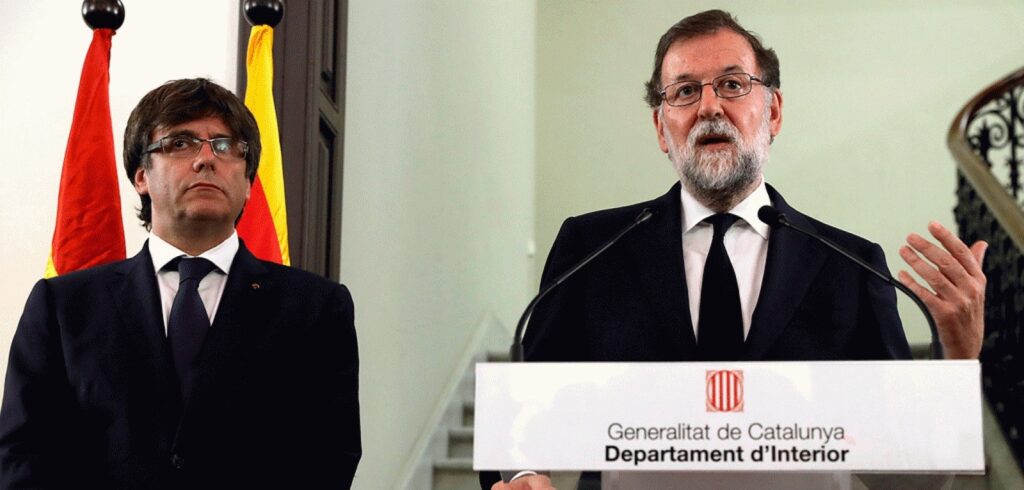20.08.2019 - 09:49
|
Actualització: 20.08.2019 - 11:49
There is a preliminary matter I would like to address and it is the controversy stirred by some government-friendly Spanish media about the conspiracy-theory spin allegedly put on the terror attacks of 17 August 2017 in Barcelona city and Cambrils. Let us be clear: this is the sort of thing that is not resolved by newspapers, but by means of a thorough official inquest and the full disclosure of all the classified information held by all the authorities. After admitting that the Ripoll imam had ties with its intelligence service, the CNI, Spain should have allowed parliaments to access all the relevant documents as they saw fit. Instead, Spain’s reaction was to use the regime’s political parties to block the sort of inquest you expect in a case like this and is commonplace the world over whenever there is a terrorist outrage of this magnitude. After such an extremely serious decision, which can only be explained by a desire to conceal information, any accusation directed at those who demand a full investigation will lack all credibility. And it is not worth another minute of our time.
Now, let’s cut to the chase.
There is something about the attacks of 17 August (17-A) that has been somewhat overlooked and, while not a core issue, it had a great deal of influence later on. That is the reason why I would like to focus my comment on this aspect today, on the second anniversary of the attacks.
I refer to the full control of the Catalan territory and institutions by Catalonia’s authorities between August 17 and 19, a state-like control which meant that the Principality of Catalonia effectively behaved like a fully independent nation. I am convinced that this set off all the alarms in Madrid, it triggered the crackdown on 20 September and the police operation on 1 October, the day of the independence referendum. PM Rajoy could have chosen to look the other way, as he did with the non-binding vote of 9 November 2014, but this time he opted for a violent confrontation. I believe what he witnessed immediately after the attacks is one of the reasons behind his decision. I think everyone recalls the tight coordination and the ability to respond to the attacks that we saw back then. Every public service worked in synchronicity, even though many staff were on their summer holidays.
For the first time ever, the Catalan police —Mossos d’Esquadra— launched operation Cronos, a plan aimed at taking control of the entire territory, which is no mean feat. Hospitals and healthcare services liaised exceedingly well with one another. Public transport was coordinated across the nation, primarily in Barcelona’s greater metropolitan area. Public news outlets established an information system that kept fake news at bay and was later praised internationally for the example they set. The buck stopped with the Catalan government and the public statements from president Puigdemont, ministers Forn, Comín and Romeva, plus police commissioner Trapero built a climate of trust. Obviously, they quickly ascertained who the culprits were and they were speedily located —it took fifty hours— to ensure they would not stage another attack. This was done in a manner that nobody could call slow or inefficient, even if there has been —arguably— some controversy as to whether it was necessary to kill all the terrorists.
Oddly, the Spanish government played no part in all of this. It went MIA. The Catalan government and cabinet ministers, with their frequent briefings and updates, were the only reference point as far as foreign media were concerned. It took PM Rajoy seven hours to get over to Barcelona city and he did not know what to do. He agreed to a public appearance in Catalonia’s Interior Ministry (picture) instead of the office of the Spanish government’s representative, which was a total breach of protocol. Additionally, there were two specific events —which all readers will recall— that I think set off all the alarms in Madrid.
The first one was when Catalan Foreign Minister Raül Romeva officially welcomed his counterparts from France and Germany, Jean-Yves Le Drian and Sigmar Gabriel, in the evening of 18 August at Barcelona airport. The Catalan administration handled the ministers’ whole stay in Barcelona —in Sigmar Gabriel’s case, there was a hiccup that was dealt with masterfully— and oversaw all the care provided to the foreign visitors who had been hit by the attack. Romeva even accompanied them to a meeting with Spanish VP Soraya Sáenz, who took a back seat throughout. Let us not forget that this was taking place barely six weeks before the independence referendum and the Spanish authorities were at pains to prevent the Catalan executive from having any contact with any European governments. Romeva’s efficacy and the way he treated them was later praised by his European counterparts.
The second alarm bell —and the definitive one, I think— came a few days later, on 26 August, as a result of the Passeig de Gràcia demonstration held to condemn the terror attacks. Every move orchestrated by the Spanish government and the monarchy to frame the march so it would suit their interests was a failure and the demonstration was a rebuke by the Catalan people and its institutions to the king and Spain’s cynicism. It also became a people’s tribute to the Catalan police, who saw their vehicles covered in flowers by members of the public. The atmosphere was reminiscent of the extraordinary times in history when the armed forces and the people have stood together hand in hand.
It was precisely that reality and that atmosphere which later triggered the violence against the referendum. If anyone harboured any doubts about Catalonia’s ability and readiness to face the future by herself, the August attacks proved them wrong. For a number of hours, a few days, Catalonia operated like a fully-independent nation, with every attribute you would expect from any country, displaying impressive efficacy, coordination and ability.
A final thought. There has been much debate about whether proper preparations for independence had been made or not. 17-A provides the answer to that question. Under so much strain, it is impossible for anyone to operate like an independent country unless they have taken the time to prepare for it. I appreciate that what happened after 1 October invited doubts and drew criticism. But when you reflect on what happened after the attacks, some of the debates that certain elements would like to keep fuelling no longer seem very sensible. On 17-A and in the aftermath of the attacks, Spain saw the writing on the wall: an independent Catalonia was a very real possibility.
This —not the events of 1 October— is the reason why Madrid’s direct rule struck the Catalan police force so hard. And this —not the events of 1 October— is the reason why Catalonia’s Foreign Ministry was taken down. This is why minister Forn and commissioner Trapero are in the regime’s crosshairs. This is the reason why they aim to weaken the Catalan administration in every possible way. And this is the reason why president Puigdemont is public enemy number one: he was the president that led the government of Catalonia for several days as if it were an independent country de facto. The vote on 1 October had nothing to do with it.
Above all, this explains the extreme urgency that has forced the Spanish State to show its true colours to the world and the public at large, taking on a brutally repressive, violent, undemocratic role that no country on the face of the earth would choose unless it was the very last resort, unless there was no other choice. Give it some thought …


